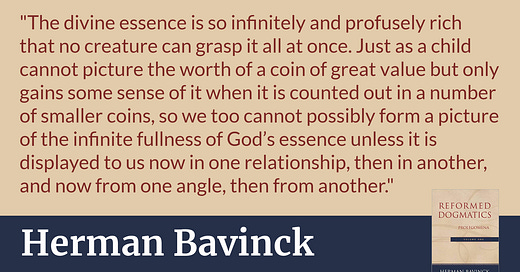God's Simplicity
“This is the message we have heard from him and proclaim to you, that God is light…So we have come to know and to believe the love that God has for us. God is love…” (1 John 1:5, 1 John 4:16; ESV)
God Is Simple
In my last post about God’s attributes, I quoted from the Belgic Confession. It says this about God, “We all believe in our hearts and confess with our mouths that there is a single and simple spiritual being, whom we call God…” (Article 1). I’m not sure if your reaction is the same as my first reaction to this statement, but I remember flinching at the word “simple.” Really? God is simple? I don’t think God is simple. I think God is complex and beyond my comprehension. How can they call God simple?
Then, someone taught me the meaning of the word “simple.” Here’s how Herman Bavinck describes God’s simplicity: “God is ‘simple,’ that is sublimely free from all composition, and that therefore one cannot make any real distinction between his being and his attributes. Each attribute is identical with God’s being: he is what he possesses” (Reformed Dogmatics, p. 118).
Simplicity vs Complexity
To help us understand this further, it’s important to look at the difference between a complex system/organism and a simple system/organism. When we think about something being complex, there are many steps and pieces to the puzzle. Many different things happen that are interconnected. When we simplify something, we remove pieces from the system and have fewer things happening.
The Epitome of Simplicity
God is the epitome of simplicity. God is not a complex system, where each of his attributes are working together to accomplish something. He IS his attributes. Our passage at the beginning says God IS light and God IS love. Other passages say God IS righteousness (Jer 23:6) and God IS a consuming fire (Heb 12:29). We cannot say that sometimes God is light and other times God is love and other times God is a consuming fire. That would make him complex. But he is simple, which means God IS each of these things all the time. “Whatever God is, he is that completely and simultaneously.” (Reformed Dogmatics, p. 118).
The Temptation of Complexity
To be honest, this concept is difficult for us to grasp/comprehend. This is an incommunicable attribute—which means we’ve never experienced something like this before. We have encountered nothing in creation that is completely simple. Everything is complex in its own way. Even the atom has complexity with positive and negative electrons.
Since we only encounter complexity in creation, we are continually tempted to think of God as complex. We are tempted to envision God as someone whose love and holiness work together to bring about his will. Sometimes God is righteous and sometimes God is merciful—kinda like us. We are complex—each of our attributes showing up at different times. God is simple. Each of his attributes flow from the fountain of his being. His attributes are always there, all the time, in everything he does BECAUSE “he is what he possesses” (Reformed Dogmatics, p. 118).
Why So Many Attributes?
At this point, some ask an important question, “If God is simple, why does the Bible give him so many attributes?” This is a fair—and good—question. There are two ways to answer this question.
First, this is how God has revealed himself to us. In scripture, he reveals himself as unity in the midst of diversity. He tells us he is simple and then gives us a variety of ways his simplicity works itself out in the world. So, if this is how God has revealed himself to us, we should listen to him.
Second, the diversity of God’s gifts doesn’t contradict his simplicity. As we pile up a list of attributes to describe God we are painting a picture of the fullness of life and being. How can we describe fullness of life and being in only a few words or attributes? We cannot do it. We need to look at it from many angles.
I’ll close with this beautiful illustration from Herman Bavinck, “The divine essence is so infinitely and profusely rich that no creature can grasp it all at once. Just as a child cannot picture the worth of a coin of great value but only gains some sense of it when it is counted out in a number of smaller coins, so we too cannot possibly form a picture of the infinite fullness of God’s essence unless it is displayed to us now in one relationship, then in another, and now from one angle, then from another.” (Reformed Dogmatics, p. 127).



